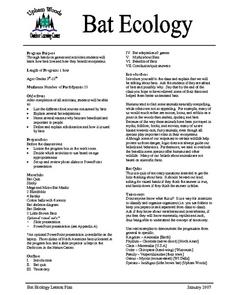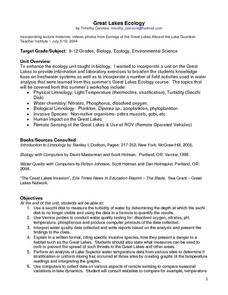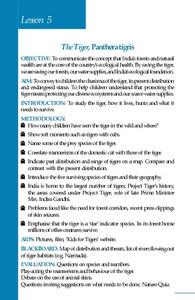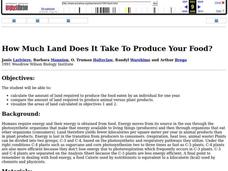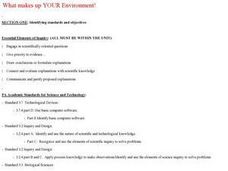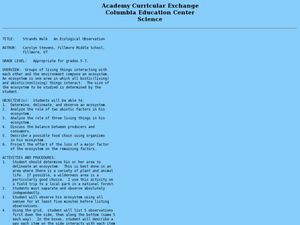Curated OER
Great Lakes Ecology
Students are able to use a secchi disk to measure the turbidity of water by determining the depth at which the sechi disk is no longer visible and using the data in a formula to quantify the results. They are able to use Vernier probes...
Curated OER
Trophic Ecology of Humans
Students analyze the trophic level of humans by first calculating the kilocalories in own their lunch. They then calulate the kilocalories in a wide variety of foods found in grocery stores and compare the kilocalories needed to acquire...
Curated OER
Stream Ecology In Wisconsin and Puerto Rico
Learners identify the different types of water and explain in what proportions they exist on Earth. They identify and correctly label the parts of the water cycle and how these parts interact with each other. Students identify the...
Curated OER
Bat Ecology
Students, through hands on games and activities, discover how bats live and how bats benefit ecosystems. They play a game designed to show them how echolocation works and another to show how mother bats locate their young through their...
Curated OER
Great Lakes Ecology
Eighth graders identify the Great Lakes, and describe the habitat of life of a loon. They are able to point to and explain one of the major river systems that enters the Great Lakes with a focus on the Clinton River and the food webs...
Curated OER
My Tree Book
Students "adopt" a tree and throughout the year record and examine its characteristics and the changes that it goes through.
Curated OER
Gorillas In The Midst
Students consider the idea of the eco-tour, and examine different aspects of the Mountain Gorilla Project eco-tour in Rwanda. They synthesize their understanding by acting as expert panelists on a morning news show that focuses on the...
Curated OER
Talking Trash - Marine Debris
Students bring in different trash items and define "marine debris" through a discussion about these items. They categorize debris and use statistics and graphing to better explain the types and amounts of marine debris found each yea
Curated OER
Biomes
Students collect information about different biomes, and locate the biomes on a world map. They read a climograph and match them to the appropriate biomes.
Curated OER
What Happened to Robin?
Students investigate animal injuries caused by humans. They present their findings to various neighborhood groups.
Curated OER
The Value of a Garden
Learners explore the history of taxonomy, the work of Carl Linnaeus, and the factors involved in the decline and extinction of a variety of botanical species.
Curated OER
Reading the Landscape: Geology and Ecology in the Nineteenth Century American Landscape Paintings of Frederic E. Church
Students use the methodology described by Prown (1982) to interpret paintings. They determine artistic, historical, and scientific content and develop an understanding of aspects of nineteenth century American culture. They study the...
Curated OER
Pea Soup Ponds
Students perform an experiment where they learn how water can be polluted by algal bloom. They grow algae with different concentrations of fertilizers or nutrients and analyze their results.
Curated OER
The Tiger, Panthera Tigris
Students explore tigers, India's national animal, discuss importance of protecting tigers and Earth's diverse ecosytems, investigate distribution of tigers in world, identify characteristics of tigers, examine natural habitat, and...
Curated OER
Down, Dung and Dirty
Students observe the changes seen in succession and the biodiversity of a community through its species richness and evenness. They create a dung culture in a clear plastic cup from horse, goat or cow dung then observe the numbers of...
Curated OER
Ecology of the Dump
Students determine which types of garbage are biodegradable and which are nonbiodegradable. They practice measuring skills, hypothesizing, taking data, and writing a lab report. Students observe the relative biodegradability of metal,...
Curated OER
How Much Land Does It Take To Produce Your Food?
Students calculate the amount of land required to produce the food eaten by an individual for one year. They compare the amount of land required to produce animal versus plant products. Students visualize the areas of land calculated.
Curated OER
What makes up YOUR Environment!
Young scholars create their own land or water environment. They make their environment livable for all the different animals they collect to put in it. Students research the types of animals that they can have in their environment, and...
Curated OER
Composting Conundrum
Students research cafeteria composting. In this composting lesson, students design a vessel that would allow the cafeteria staff to collect food scraps for composting. Then students build a prototype and present it to the class. Lastly...
Curated OER
Trash to Treasures
Students analyze the artwork of Jaune Quick-To-See Smith. For this service project analysis, students create interpretations of their service experience. Students reflect in words utilizing the "I Am" Model. The student rubric helps...
Curated OER
Protecting Our Planet
Learners examine the impact of pollution. In this pollution lesson, students watch Protecting Our Planet, then participate in a simulation of the effect of pollution on a variety of organisms.
Curated OER
Strands Walk-An Ecological Obseravtion
In this ecosystem worksheet, students investigate an ecosystem at a local park or national forest, they make observations for five minutes, they complete a grid of their observations and they construct a hypothetical food chain. Students...
Curated OER
How to: Build a Plant Cell
Students build a 3-dimensional model of a plant cell with household objects. In this plant biology lesson, students construct replica plant cells in groups of three. After completing their projects, students share their creations with...
Curated OER
Explore Efficient Energy Uses
In this energy worksheet, students explore different ways to conserve energy. They write a short description for each of the 10 methods presented.
Other popular searches
- Population Ecology
- Animal Ecology
- Human Ecology
- Behavioral Ecology
- Ecology Principles
- Community Ecology
- Pond Ecology
- Ecology Organizations
- Global Ecology
- Ecology Ethics
- Ecology Food Webs
- Ecology and Plants





